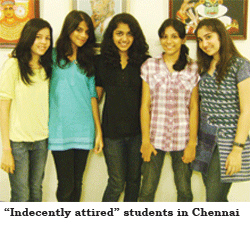Despite being ruled by former film star-turned chief minister J. Jayalalithaa who shook more than a leg on the silver screen during her heyday, a rising wave of puritanism is sweeping over campuses in the industrially and educationally advanced southern state of Tamil Nadu (pop.72 million), ranked third nationwide in the Union finance ministry’s latest (September 26) ‘under-development index’ compiled by a panel headed by Dr. Raghuram Rajan (as chief economic adviser of the ministry). This is making life difficult for over 700,000 students of the state’s 520 engineering and 503 arts and science colleges.
Back in 2006, overriding student protests, Anna University decreed a dress code for students in all 520 affiliated engineering colleges compelling all women to switch from informal jeans and casuals to salwar kameez, and men to formal shirts and trousers. Taking a cue from Anna University, on September 1 the Jayalalithaa-led AIADMK government announced a similar “appropriate attire” code for the state’s 60 government and 446 private arts and science colleges governed by the Directorate of Collegiate Education (DCE). According to DCE spokespersons, the dress code diktat — yet to be implemented — was prompted by several college principals complaining about students attending classes in “indecent” attire.
 While the proposed dress code has aroused indignation within the students community and among liberal-minded parents, the majority of college heads and principals are known to favour it. “Our students are from different backgrounds and tend to dress very casually if they aren’t compelled to adhere to a dress code. We have to train them to be appropriately dressed for campus placements and don’t allow casual wear such as T-shirts and jeans in college. A dress code is essential to inculcate discipline and good values in students, and they should take it in the right spirit,” says Dr. Leela Abraham, principal of the Alpha Arts and Science College, Porur, a suburb of Chennai.
While the proposed dress code has aroused indignation within the students community and among liberal-minded parents, the majority of college heads and principals are known to favour it. “Our students are from different backgrounds and tend to dress very casually if they aren’t compelled to adhere to a dress code. We have to train them to be appropriately dressed for campus placements and don’t allow casual wear such as T-shirts and jeans in college. A dress code is essential to inculcate discipline and good values in students, and they should take it in the right spirit,” says Dr. Leela Abraham, principal of the Alpha Arts and Science College, Porur, a suburb of Chennai.
Considering that an informal dress code has already been imposed by most government and private colleges in the state, liberal academics and parents are perplexed by the state government’s focus on a non-issue when numerous important academic and administrative issues in higher education are crying for attention. “Most managements have informally imposed dress codes in colleges to project their institutions as academies of learning. It is a socialisation process for students which shouldn’t be construed as an intrusion on personal freedom. Most students follow these norms voluntarily,” says Kala Shreen, a Chennai-based sociologist and visiting researcher at Queen’s University, UK.
However, more mature university students, who are also subject to sartorial impositions, believe that personal and constitutional rights are being abridged by “under-educated rustics over-promoted into positions of authority in most higher education institutions”, as an angry postgrad student of Madras Christian College puts it. According to this student who prefers to remain anonymous, socially backward politicians-turned-educationists who run self-financing engineering colleges beyond Chennai city limits, have appointed themselves arbiters of morality and impose rustic norms and unreasonable restrictions on students. “In many colleges, gender discrimination is the rule. Students are not allowed to interact freely with the opposite sex and are penalised with fines if they don’t conform to rules and regulations. Dress codes particularly target women students and fawning college principals endorse promoters’ illiberal prejudices on the specious argument that modest attire prevents harassment and sexual assaults on women,’’ he says.
Curiously even liberal arts academics tend to be unaware that prescribing dress codes under the guise of preserving Indian culture and values, amounts to infringing the freedom of expression of students, a fundamental right under the Constitution. They also gloss over the inconvenient reality that imposition of dress codes and behaviour diktats adversely affect personality development of students. “Academics should not tolerate arbitrary moral policing by university or government authorities. If students dress outrageously and distractingly, faculty members can counsel them. Adult students should be encouraged to take responsibility for their deportment and face the social consequences, if any. Imposing trivial constraints limits their growth and maturity, results in loss of self confidence and could prevent them from forming healthy social relationships with the opposite sex in the workplace and society,” warns Prof. M. Ravichandran of the Dr. Ambedkar Arts and Science College, Chennai, in a commendably forthright condemnation of government and academia focus on trivia.
Unfortunately this learned professor’s dissenting viewpoint is likely to be a voice in the wilderness within a simple-minded academic community which regards collegiate and university environments as continuation of school education.
Hemalatha Raghupathi (Chennai)
Macabre shortage
Despite its huge population of 1.21 billion, contemporary India has only 600,000-650,000 qualified allopathic medical practitioners, a ratio of one doctor to 1,700 citizens as against the WHO (World Health Organisation) recommended ratio of 1:1,000. But even the 30,000 MBBS graduates and 18,000 specialists certified annually by the country’s 387 medical colleges (181 government-run and 206 private), may not have the practical experience necessary because of a shortage of cadavers required for study and dissection. This problem is particularly acute in the southern state of Tamil Nadu (pop. 72.14 million) which boasts the largest number of medical colleges in India, with 21 government and 22 private colleges graduating 5,525 medical practitioners annually.
According to Dr. K. Prakasam, president of the Tamil Nadu Chapter of the Medical Council of India, every medical graduate should have cadaver dissection experience. The state’s private colleges require at least 250-300 cadavers for study and dissection against which the supply is a mere 30-40 per year. “Private medical colleges rely on people who voluntarily pledge their bodies for medical research after death, while government medical colleges are assured of adequate supplies of cadavers from hospital mortuaries in which many bodies are unclaimed. In the circumstances most private medical college students don’t get an opportunity to dissect cadavers. Demo dissections conducted by professors are not sufficient,” says Prakasam.
 This is an alarming situation since private colleges produce 51 percent of medical graduates annually and doctors’ sound knowledge and experience of the human anatomy and morphology is vital. “It is frightening that thousands of medical practitioners have not adequately studied the human body,” adds Dr. M. Ashok, an experienced Chennai-based diabetologist.
This is an alarming situation since private colleges produce 51 percent of medical graduates annually and doctors’ sound knowledge and experience of the human anatomy and morphology is vital. “It is frightening that thousands of medical practitioners have not adequately studied the human body,” adds Dr. M. Ashok, an experienced Chennai-based diabetologist.
Spokespersons of top-ranked medical colleges in Chennai say there are numerous problems about obtaining cadavers including the condition of bodies, refrigeration, students’ safety and legal and logistics issues. “We are entirely dependent upon NGOs which bury unclaimed bodies and dubious characters — who may be grave robbers — for the supply of cadavers. We live in constant fear of legal problems,’’ says the dean of a top-ranked medical college.
Although sophisticated plastic replicas of the human anatomy are manufactured by several highly respected companies such as 3B Scientific and Denoyer-Geppertand in the US, and KeMaJo and Xincheng Scientific in China, Dr. K. Rajendran, former professor of medicine at Chennai’s Stanley Medical College (estb. 1938) insists that dissection of real human cadavers is essential for thorough study of medicine. “The feel and three dimensional experience a student derives from working on a human cadaver cannot be substituted. Videos, 3D models and digital simulation are all good learning aids, but they cannot duplicate live dissection experience,” says Rajendran.
Adds a senior professor and registrar of another top-ranked medical university in Chennai: “Every human body is unique and each time a student performs a surgery or dissection on a human cadaver she discovers a new secret of the human anatomy.’’
With public health expenditure (Centre plus states) aggregating a mere 1.2 percent of GDP as against 7-8 percent in OECD countries and a continuous drain of qualified medical practitioners to the West, India’s public health system is under severe strain. Among its infirmities are a mere 0.9 hospital beds per 1,000 population, chronic absenteeism in the country’s 24,049 primary health and 4,833 community health centres, and continuous pilferage of drugs from public hospitals and primary health centres.
To this list add one more — shortage of cadavers for medical students.
S. Badhrinarayanan (Chennai)



























